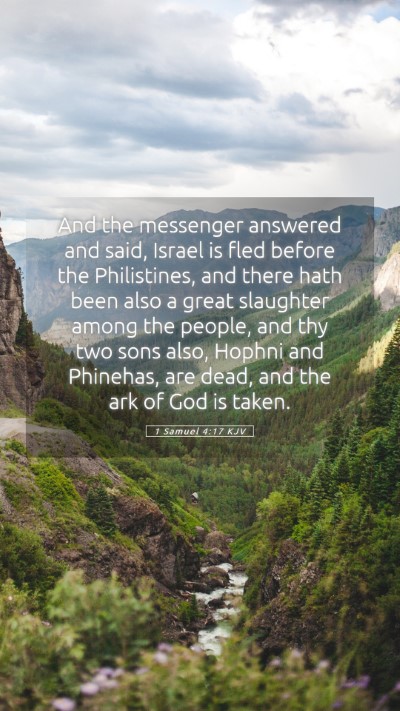Understanding 1 Samuel 4:17
Bible Verse: 1 Samuel 4:17 - "And the messenger answered and said, Israel is fled before the Philistines, and there hath been a great slaughter among the people, and thy two sons also, Hophni and Phinehas, are dead, and the ark of God is taken."
This verse serves as a pivotal moment in the narrative of the Israelites and their tumultuous relationship with God, depicting a profound moment of loss and realization. The context of this verse is critical for comprehensive Bible verse understanding and Bible verse interpretations.
Contextual Background
The events leading up to 1 Samuel 4:17 describe a battle between the Israelites and the Philistines, where the Israelites, having relied on the presence of the Ark of the Covenant for victory, instead faced a devastating defeat. This illustrates a significant theme in Scripture regarding the importance of genuine reliance on God rather than merely the symbols of His presence.
Commentaries Breakdown
The insights from various public domain commentaries shed light on the deeper meaning of this verse:
- Matthew Henry: Henry emphasizes that the report of the messenger is filled with catastrophic news, reflecting on the moral decay and unfaithfulness of the priesthood, represented by Eli's sons, Hophni and Phinehas. Their deaths signify God's judgment and serve as a grim reminder of the consequences of sin. Henry points out that the loss of the Ark further symbolizes the departure of God's presence from Israel as a direct result of their rebellion.
- Albert Barnes: Barnes highlights the gravity of losing the Ark, symbolizing the loss of God's favor. He interprets this event as illustrating God's displeasure with Israel's reliance on physical artifacts rather than on His covenant. The deaths of Hophni and Phinehas, in conjunction with the defeat in battle, represent a collective failing, both in leadership and spiritual dedication among the people of Israel.
- Adam Clarke: Clarke offers a perspective on the emotional weight of the news conveyed by the messenger. He discusses how this profound loss would resonate with Eli, the high priest, as well as the people of Israel. Clarke underscores the significance of the Ark being taken as an emblem of God's covenant, thus marking a critical point in Israel’s spiritual history where they would need to reflect on their relationship with God.
Theological Implications
This passage raises essential Bible study insights regarding the significance of true faith. The reliance on the Ark rather than God Himself signifies a fundamental misunderstanding of how to engage with the Divine. The Meaning of Bible verses such as this challenges readers to introspect on their reliance on religious symbols versus an authentic relationship with God.
Key Themes
- Divine Judgment: The verse signifies a crucial moment of reckoning for Israel, once a favored nation now lost to defeat due to their shortcomings.
- Leadership Failure: Hophni and Phinehas symbolize failed leadership, both morally and spiritually, leading the nation away from God.
- The Ark of the Covenant: The Ark's capture symbolizes the severance of Israel’s relationship with God and poses questions about the nature of faith vs. ritual.
Cross References
- 1 Samuel 2:30: God's promise of judgment against Eli's household for their sinful behavior.
- Jeremiah 7:12-14: Warning against trusting in false security derived from the temple, similar to Israel's trust in the Ark.
- Psalms 78:60-64: Discusses God's anger towards His people for their rebellion and the subsequent consequences.
Application for Today
In light of this passage, modern readers can reflect on the nature of their own faith practices. How to interpret Bible verses like 1 Samuel 4:17 hinges on understanding that genuine faith must go beyond mere traditions and must be rooted in authentic devotion to God. This verse can serve as a reminder to evaluate one's spiritual dependence and to seek a deeper relationship with God rather than relying on religious symbols or rituals alone.
Questions for Reflection
- What does this passage reveal about the nature of God’s expectations from His people?
- How can we ensure that our faith is not merely ritualistic but genuinely relational?
- In what ways might we be experiencing a 'departure' from God similar to what Israel faced?


